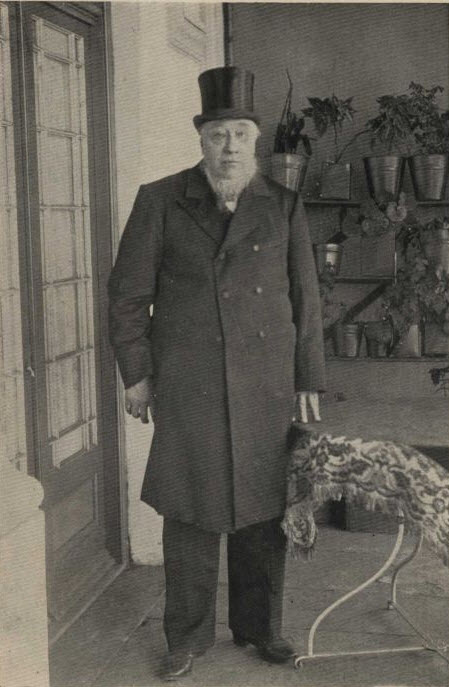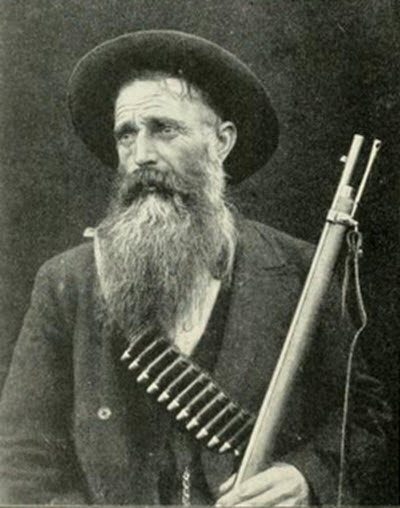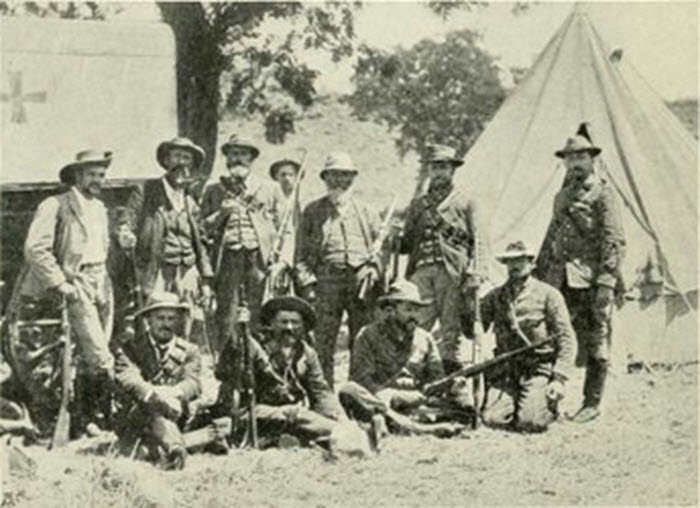
Stephanus Johannes Paulus Kruger, better known as "Paul Krueger" or " Oom Pauk" (Uncle Paul") was a Boer national hero. war leader, and last president of the Transvaal Republic. Kruger was born on October 19, 1825 in the Cape Colony, and died in exile in Switzerland.
Kruger is a controversial figure, and is both praised and condemned, being regarded by many as a national folk hero and a champion of Afrikaaner independence and nation, while others consider him an ignorant war monger and oppressor of the indigenous Africans. There is no doubt, however, that Kruger was a central figure in Boer aspirations for an independent nation state, and key figure in the war with Great Britain.
His life story was a remarkable history of rough and tumble adventure typical of the frontier life of many Boers. As a young child he joined his parents on the perilous trek out of British occupied territories to the freedom of the unorganized lands to the north, where the Boers forged a new nation. As a teenager, he was renowned for his bravery and hunting skills. While hunting a rhinoceros, his rifle exploded and he lost his left thumb. The local African tribes people nicknamed him Mamelodi'a Tshwane ("whistler of Apies River"), for his ability to imitate bird songs.
He had almost no formal education. His literal interpretation of the Bible led Kruger to believe that the Earth was flat. Yet, despite this lack of formal knowledge, Krueger was known for his intelligence and as an astute judge of men's characters. He spoke several languages including Afrikaans, Dutch, English and German.
Kruger came to prominence during the First Boer war, when he served on the Boer delegation which negotiated the Transvaal's independence from Great Britain. Building on the status he had gained in his service to the Boer cause, Kruger became an increasingly prominent figure in Boer public affairs. He was appointed commander in chief of the Boer forces, and later served as Vice President during the inter-war years.

On May 9, 1883 he was elected the third (and last) President of the independent Transvaal Republic. His term in office was turbulent from the start. Boer independence was threatened by the influx of uitlanders (outsiders) who came to the Boer territories to work in the newly discovered gold fields. Agitation by the uitlanders and British Imperialists that voting rights be extended to these foreigners led to unrest and tensions with Great Britain.
Although Kruger was willing to compromise by extending voting rights to foreign white males after they had been in the country a certain number of years, Britain wanted more concessions which would have essentially undermined Boer sovereignty by making outsiders a majority or at least a very significant voting presence. Britain issued an ultimatum and began to deploy troops to its South African colony in clear preparation for war against the Boers.
Seeing the British giant ready itself for war, Kruger compared the struggle as that between a lion and a man armed with a pocket knife. He concluded that despite the unequal strength, the man - namely the Boer republic - had no choice but to use the only weapon it had to defend itself, because the alternative was death. He concluded also that the only chance of winning was to launch a preemptive strike against Britain in the hopes of scoring a decisive victory before it could fully bring its armed forces to bear against the small Boer republics.

Kruger issued an ultimatum to Great Britain to withdraw all its troops from the border within 48 hours or face war. Britain proudly refused and the Second Boer War began on October 11, 1899. In accordance with its war plan, Boer commando units crossed into British territory. They met with initial success, including surrounding and besieging the towns of Ladysmith and Kimperley. Kruger did not play an active role in the fighting, but was in touch with his commanders by telegram and messenger.
However Britain was able to bring the vast manpower resources of its empire to bear and eventually the tied turned against the Boers. They were forced back into their home territories and the capital of the Transvaal was occupied. To avoid capture, Kruger and his family and aides escaped to the Portuguese territory of Mozambique and then went to Europe by boat. He took with him the Transvaal's gold reserves and their whereabouts are still unknown and sought by modern treasure hunters.
Pro-British propagandists described Kruger's flight into exile thus:
On the 19th, in the grey of the dawn, Mr. Kruger slunk from South Africa on board the Dutch man-of-war Gelderland. With the utmost secrecy he was smuggled to sea to evade, not his foes the British, but his dupes the Boers, the luckless refugees who lusted for revenge on the man who had ruined their country, deceived, robbed, and deserted themselves. When he departed his moneybags were full! -- South Africa and the Transvaal War (1901)
On arriving in France, Kruger was met by large cheering crowds, who regarded him as a symbol of resistance against the British Empire. He then traveled to Germany. However he was denied an audience with the German Kaiser, who wished to improve relations with the British. Kruger considered this a deep betrayal as he had hoped for German military assistance. And so Kruger settled in the Netherlands where he maintained a sort of government in exile.
Although he was no longer actively involved in the struggle, Kruger remained an important rallying point for Boer resistance until the end. Upon the Boer surrender, Kruger spoke of his inexpressible sorrow. He would never return to his native country alive, dying in exile. However his body was eventually repatriated and received a state funeral after the war.